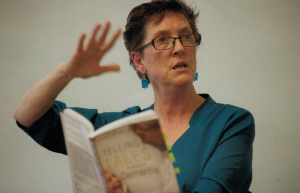 I am a writer and editor, a teacher, a trainer, a facilitator, a consultant, an adviser… I am often asked to speak either on issues connected with dementia , or on the history of Rock Against Racism (RAR) and the connection between punk, feminism and anti-racism.
I am a writer and editor, a teacher, a trainer, a facilitator, a consultant, an adviser… I am often asked to speak either on issues connected with dementia , or on the history of Rock Against Racism (RAR) and the connection between punk, feminism and anti-racism.
Dementia and punk – what a strange combination!
Maybe not so strange after all. Most people who were punks circa 1976 are now in their 50s and 60s, and many of us will have come into contact with dementia one way or another. Some will have cared for a parent or other relative with dementia, and some erstwhile punks may now have dementia themselves.
In my own case punk and RAR were formative experiences in my youth; and being drawn into the dementia world as a result of my mother’s illness was transformative for me in my middle years. That explains the biographical link.


Thematically, I can see a connection: for me, it’s all about debunking stereotypes, challenging the status quo and standing up for human rights.
Imaginatively: one of the things I most enjoyed about punk was the use of collage and the way apparently incongruous thoughts, images and clothing were juxtaposed. Similarly, people with dementia sometimes use language or imagery in an unconventional way, making unexpected connections which can help us see the world in a new way. (This is well expressed in John Killick’s book Poetry and Dementia: A Practical Guide.)
People with dementia who contributed to my book People with Dementia Speak Out sometimes talk about the liberating effect of ‘having nothing left to lose’ and how this frees them to express themselves – socially, politically, creatively – in ways they didn’t feel able to do when they were living a ‘normal’ life. This will ring a bell with a lot of people who identified with punk.
Here’s a bit of background information about me:
I taught for many years in adult and further education, and later worked for a long time at Amnesty International UK.
While I was teaching at Hackney College, employed by the Inner London Education Authority (ILEA), I co-wrote and co-edited (with Irene Schwab and Roxy Harris) Language and Power, a radical and influential book of language awareness learning materials for the multi-ethnic classroom. This book, published by Harcourt Brace Jovanovich in 1990, was developed within ILEA’s Afro-Caribbean Language and Literacy Project and was completed at the very moment that ILEA was abolished by the Thatcher government.

More recently I have worked in a variety of organisations in the voluntary sector, supporting family carers and patients trying to navigate their way through the labyrinth of the health and social care system.
Here are some booklets I wrote to support family carers when the person they are caring for is in hospital and is nearing the end of their life. (Sadly, no longer available.)


I have extensive experience working with family carers, patients and health professionals, and with volunteers who are keen to help improve health and care services. I have supported patients and family carers in one to one and group settings, and have devised and delivered a variety of courses and workshops – for example, for family carers of people with dementia and for bereaved carers. I regularly give presentations, facilitate workshops and chair sessions at the annual UK Dementia Congress. Recently I have taken part in initiatives by the Alzheimer’s Society and Dementia Action Alliance to identify the needs of LGBT+ people affected by dementia and pilot new forms of support. I now facilitate the Rainbow Memory Cafe at Opening Doors London, a support group for LGBT+ people living with dementia, caring for someone with dementia, or worried about their memory.
As illustrated elsewhere on this website, my early writings were mainly published in radical magazines such as Temporary Hoarding and Spare Rib, and some articles, autobiographical pieces and short stories have been included in collections published by Virago, The Women’s Press, Sheba Feminist Publishers, Bell and Hyman, Prism Press, Ink Links and Penguin.

These days, my reviews and articles are more likely to appear in the Journal of Dementia Care . For example, here is an article about David Clegg's wonderful book Tell Mrs Mill her husband is still dead.
When I’m not pogoing or interviewing people with dementia…
… I sing with the Crouch End Festival Chorus, a large North London choir with a reputation for tackling a very wide range of music – from Thomas Tallis to Ray Davies. We often sing at the Proms and have made several recordings for Radio 3 and Classic fm. Our English language recording of Bach’s St John Passion has received great critical acclaim.
We also do a lot of recording work for films and TV series, and can be heard on the soundtrack to many an episode of Doctor Who. The photo shows the Crouch End Festival Chorus with our conductor David Temple and distinguished soloists at the Royal Festival Hall in July 2018.

You can get in touch with me here.
